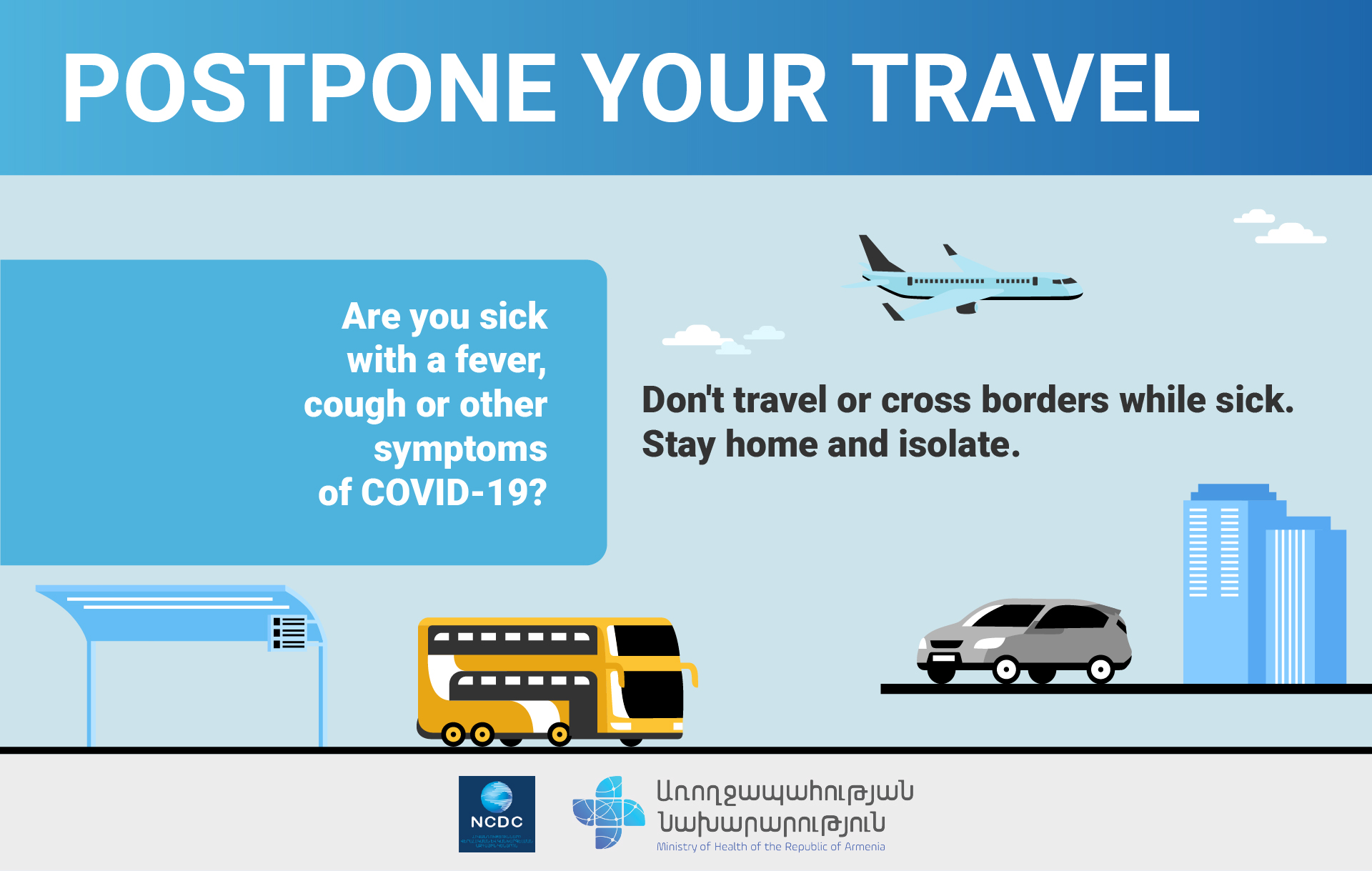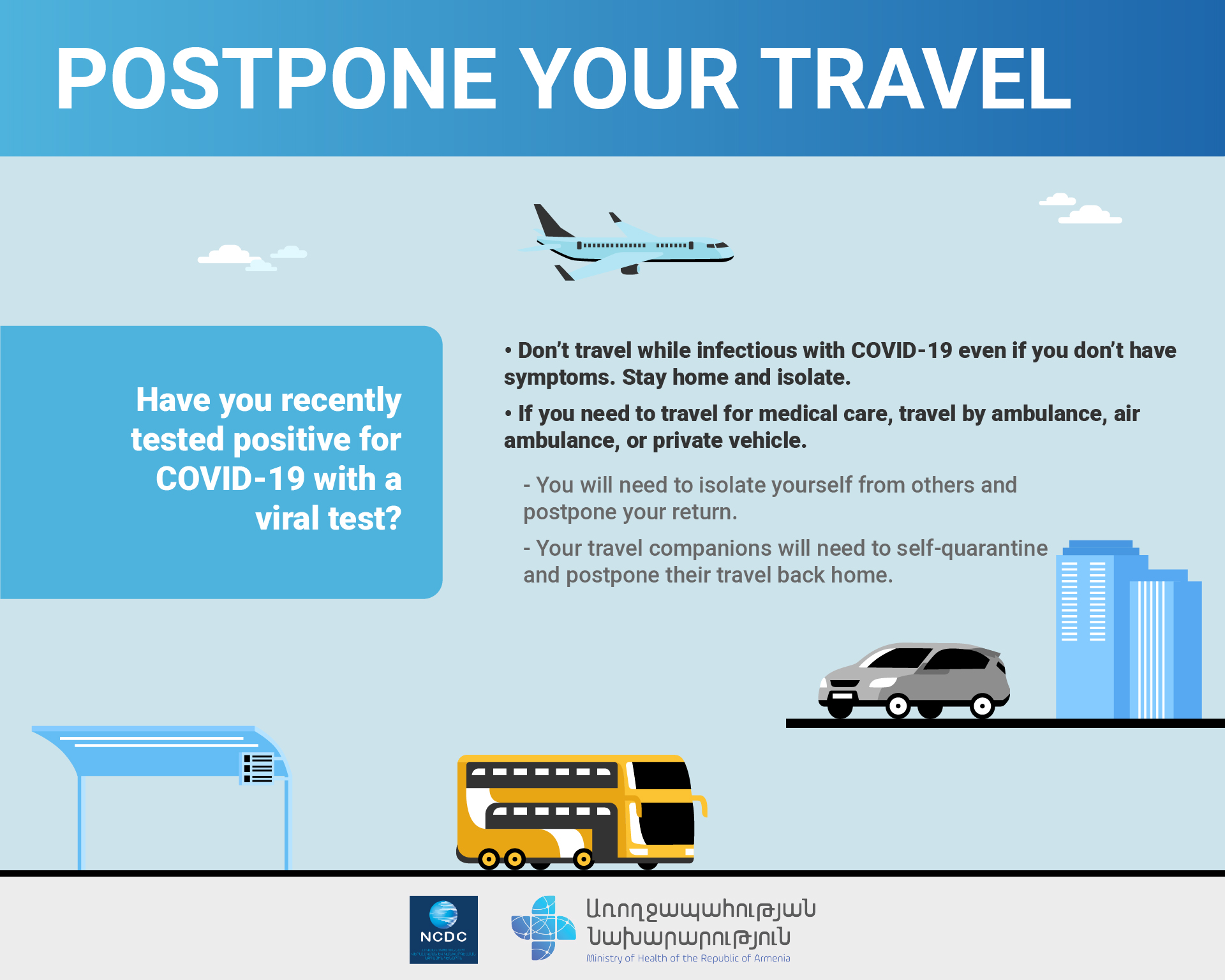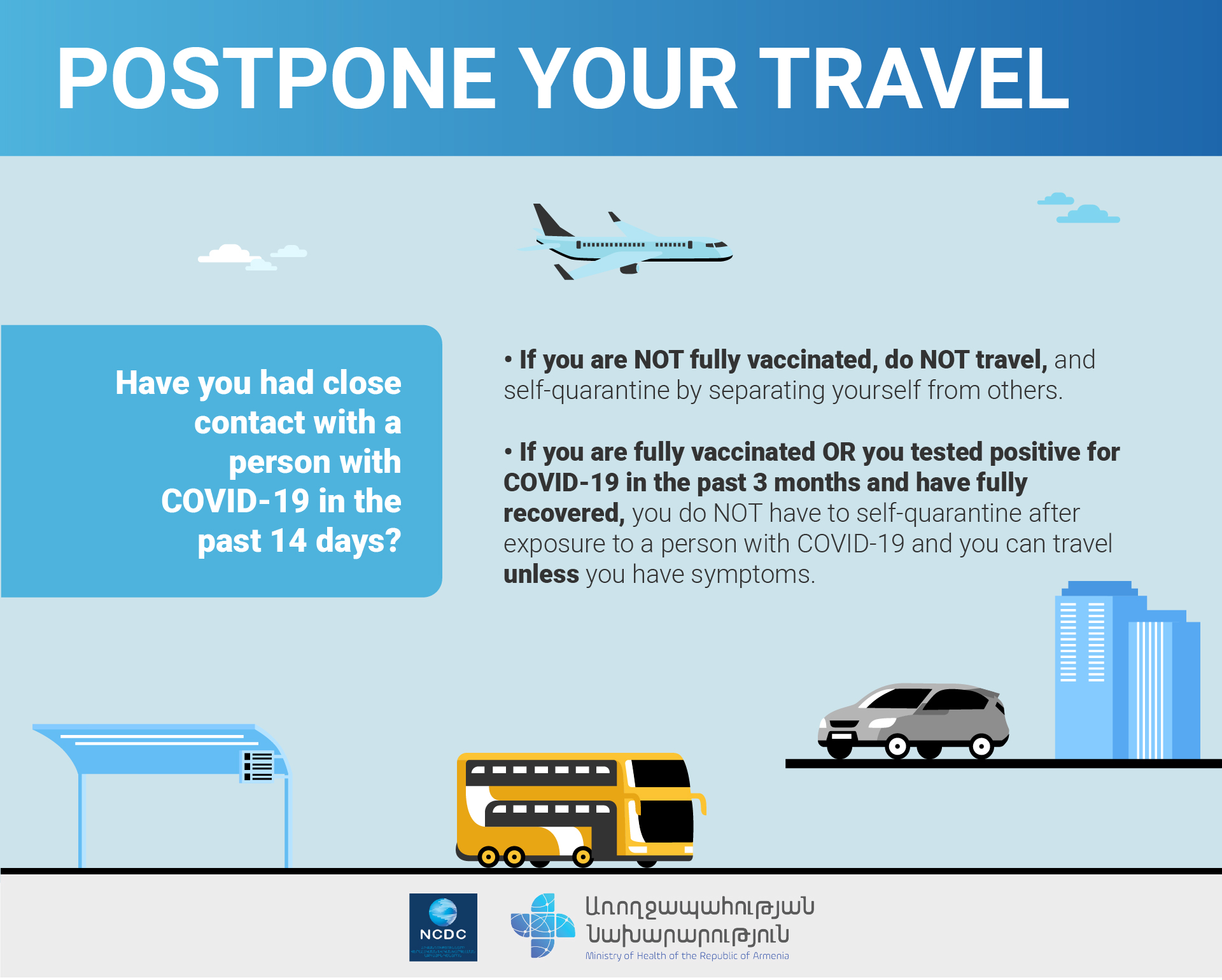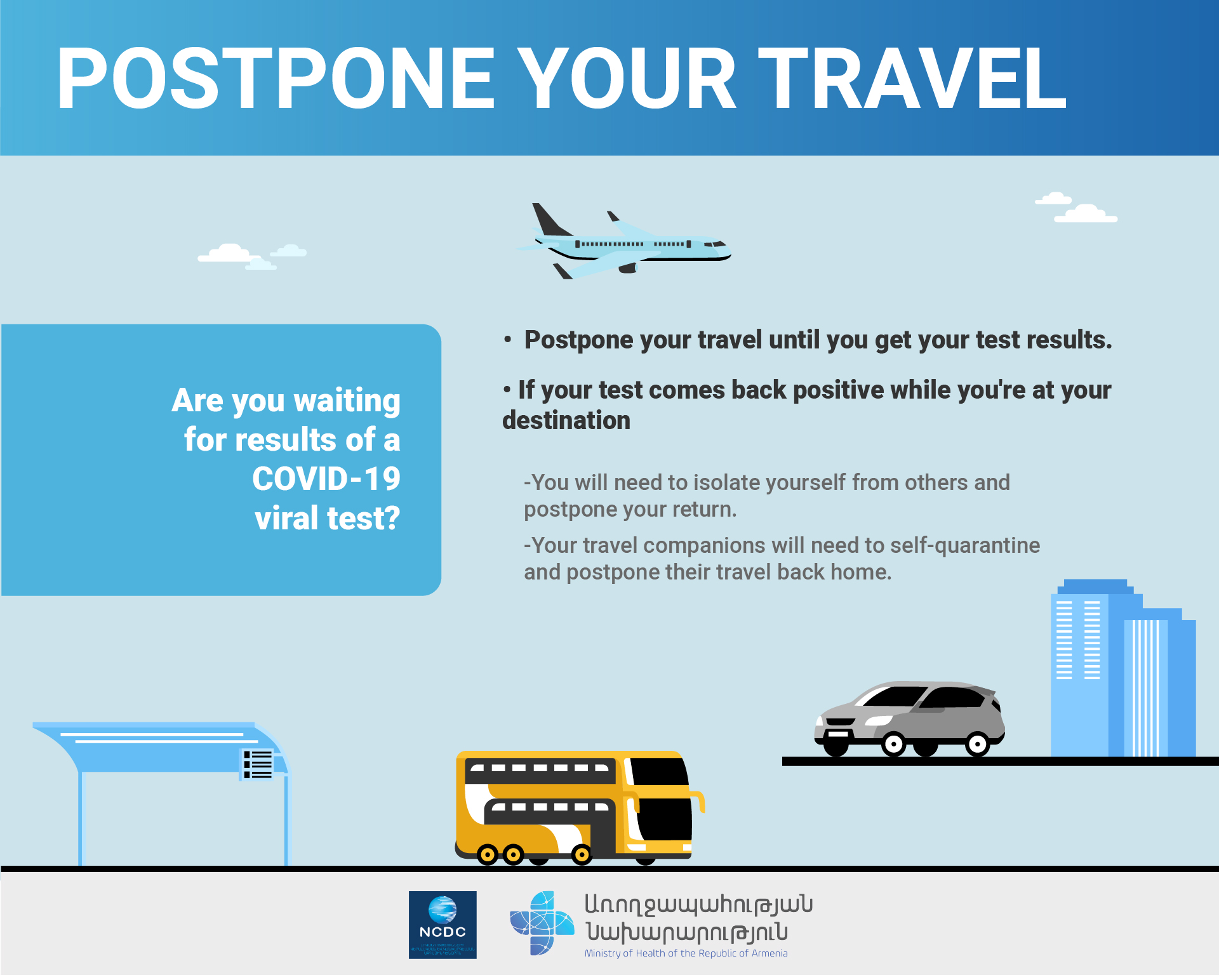When not to travel
It is recommended to delay travel until you are fully vaccinated, because travel increases your chance of getting and spreading COVID-19. If you are not fully vaccinated and must travel, follow recommendations for unvaccinated people traveling internationally or domestically. ¹
Some people should not travel. People who are sick with symptoms of COVID-19, have recently tested positive for the virus that causes COVID-19, or have been exposed to a person with COVID-19 pose a very high risk to others during travel. This page gives advice on when and how long these people should postpone travel to avoid spreading infection. ¹
Don’t travel if you or any of your travel companions:
○ Are sick with symptoms of COVID-19 (even if fully vaccinated against COVID-19 or have recovered from COVID-19 in the past).
○ Have suspected or diagnosed COVID-19 (even if you don’t have symptoms)
○ Have been around someone with suspected or diagnosed COVID-19 in the past 14 days (even if they did not have symptoms).
■ People who have recovered from COVID-19 within the past 3 months, or are fully vaccinated, do not need to self-quarantine and can travel after an exposure, unless they have symptoms of COVID-19.
Getting trip cancellation insurance might help ensure you are able to make a last-minute cancellation or change your itinerary without losing money on flights, cruises, train tickets, or pre-paid lodgings.
For all travel, take preventive measures to protect yourself and others, such as wearing a mask for the duration of your trip. It is recommended that travelers who are not fully vaccinated continue to wear a mask and maintain physical distance when traveling. ¹
When to Postpone your Travel
Check these common scenarios to see if you or your travel companions should postpone your travel. This list does not include all possible situations. Talk to your healthcare provider before you travel if you are unsure whether any of these situations apply to you or your travel companions.
Scenario 1: Are you or your travel companions sick with fever, cough, or other symptoms of COVID-19?
 Don’t travel or cross borders while sick with symptoms of COVID-19 (even if you are fully vaccinated against COVID-19 or recovered from COVID-19 in the past). Stay home and isolate yourself from others until it’s safe for you to end home isolation.
Don’t travel or cross borders while sick with symptoms of COVID-19 (even if you are fully vaccinated against COVID-19 or recovered from COVID-19 in the past). Stay home and isolate yourself from others until it’s safe for you to end home isolation.
If you need to travel to get medical care, the safest way to travel is by ambulance, air ambulance, or private vehicle. Wear a mask while around others. Don’t travel on commercial vehicles (bus, taxi, rideshare), trains, airplanes, ships, or boats while sick.
If you test negative for COVID-19 but you are still sick, postpone your travel until you’re well – other contagious diseases can spread through travel, too. If you have a fever (feel feverish or have a temperature of 38℃ or higher), wait at least 24 hours after your fever is gone without using fever-reducing medications.
Scenario 2: Have you or your travel companions recently tested positive for COVID-19 with a viral test?
 Don’t travel while infectious with COVID-19 even if you don’t have symptoms. Stay home and isolate yourself from others. Postpone your travel until it’s safe for you to end home isolation.
Don’t travel while infectious with COVID-19 even if you don’t have symptoms. Stay home and isolate yourself from others. Postpone your travel until it’s safe for you to end home isolation.- If you need to travel to get medical care, the safest way to travel is by ambulance, air ambulance, or private vehicle. Wear a mask while around others. Don’t travel on commercial vehicles (bus, taxi, rideshare), trains, airplanes, ships or boats if you have (or think you may have) COVID-19.
Scenario 3: Did you or your travel companions have close contact with a person with COVID-19 in the past 14 days?
 If you are not fully vaccinated, do NOT travel, and self-quarantine by separating yourself from others.
If you are not fully vaccinated, do NOT travel, and self-quarantine by separating yourself from others.
During your quarantine period
● If you get sick, isolate yourself from others, get tested for COVID-19, and postpone your travel until it’s safe for you to end home isolation.
● If you need to travel to get medical care, the safest way to travel is by ambulance, air ambulance, or private vehicle. Wear a mask while around others. Don’t travel on commercial vehicles (bus, taxi, rideshare), trains, airplanes, ships or boats if you have (or think you may have) COVID-19.
● If you test positive for COVID-19, see Scenario 2.
● If you test negative for COVID-19, you should still finish your quarantine period before traveling.
If you are fully vaccinated, you do NOT have to self-quarantine after exposure to a person with COVID-19 and you can travel unless you have symptoms (monitor for symptoms).
If you tested positive for COVID-19 in the past 3 months and have fully recovered, you do NOT have to self-quarantine after exposure to a person with COVID-19 and you can travel unless you have symptoms (monitor for symptoms).
Scenario 4: Are you or your travel companions waiting for a COVID-19 viral test result?
 A viral test checks for current infection.
A viral test checks for current infection.
Do not travel until you get your test results.
If you test positive for COVID-19, see Scenario 2.
If you test negative for COVID-19, check Scenarios 1 and 3 to make sure you don’t have another reason to postpone your travel.
If you happen to travel before you get your results, and your test comes back positive while you’re at your destination
● You will need to isolate yourself from others, including your travel companions, and postpone your return until it’s safe for you to end home isolation.
● Your travel companions will need to self-quarantine and postpone their travel back home. Their quarantine period will start after you start to self-isolate from them. If you don’t self-isolate from your travel companions, their quarantine period will start after you have recovered from COVID-19.
● If you or your travel companions make plans to travel before it’s safe, public health authorities can restrict your travel. ¹

